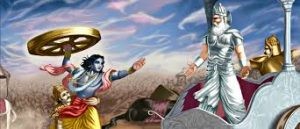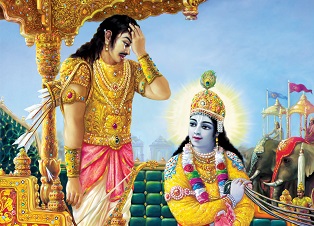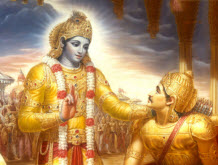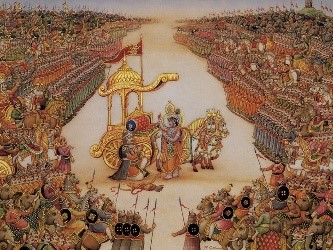
BHAGAVAD GITA Solution to all our problems – ANGER ## Part -1
ANGER
Chapter 2 / Shloka 56
दुःखेष्वनुद्विग्नमनाः
सुखेषु विगतस्पृहः
।
वीतरागभयक्रोधः स्थिधीर्मुनिरुच्यते
॥ ५६
॥
duḥkheṣv anudvigna-manāḥ
sukheṣu vigata-spṛhaḥ
vīta-rāga-bhaya-krodhaḥ
sthita-dhīr munir ucyate
Synonyms
duḥkheṣu —
in the threefold miseries; anudvigna-manāḥ —
without being agitated in mind; sukheṣu —
in happiness; vigata-spṛhaḥ —
without being interested; vīta —
free from; rāga —
attachment; bhaya —
fear; krodhaḥ —
and anger; sthita-dhīḥ —
whose mind is steady; muniḥ —
a sage; ucyate —
is called.
Translation
One
who is not disturbed in mind even amidst the threefold miseries or elated when
there is happiness, and who is free from attachment, fear and anger, is called
a sage of steady mind.
Purport
The word muni means
one who can agitate his mind in various ways for mental speculation without
coming to a factual conclusion. It is said that every muni has
a different angle of vision, and unless a muni differs from other munis, he
cannot be called a muni in the strict
sense of the term. Nāsāv ṛṣir yasya mataṁ na bhinnam (Mahābhārata,
Vana-parva 313.117). But a sthita-dhīr muni, as
mentioned herein by the Lord, is different from an ordinary muni. The sthita-dhīr
muni is always in Kṛṣṇa consciousness, for he has exhausted
all his business of creative speculation. He is called praśānta-niḥśeṣa-mano-rathāntara (Stotra-ratna 43),
or one who has surpassed the stage of mental speculations and has come to the
conclusion that Lord Śrī Kṛṣṇa, or Vāsudeva, is everything (vāsudevaḥ
sarvam iti sa mahātmā su-durlabhaḥ). He is called a muni fixed
in mind. Such a fully Kṛṣṇa conscious person is not at all disturbed by the
onslaughts of the threefold miseries, for he accepts all miseries as the mercy
of the Lord, thinking himself only worthy of more trouble due to his past
misdeeds; and he sees that his miseries, by the grace of the Lord, are
minimized to the lowest. Similarly, when he is happy, he gives credit to the
Lord, thinking himself unworthy of the happiness; he realizes that it is due
only to the Lord’s grace that he is in such a comfortable condition and able to
render better service to the Lord. And, for the service of the Lord, he is
always daring and active and is not influenced by attachment or aversion.
Attachment means accepting things for one’s own sense gratification, and
detachment is the absence of such sensual attachment. But one fixed in Kṛṣṇa
consciousness has neither attachment nor detachment because his life is
dedicated in the service of the Lord. Consequently, he is not at all angry even
when his attempts are unsuccessful. Success or no success, a Kṛṣṇa conscious
person is always steady in his determination.
ANGER
Chapter 2 / Shloka 62
ध्यायतो विषयान्पुंसः
सङ्गस्तेषूपजायते ।
सङ्गात्सञ्जायते कामः
कामात्क्रोधोऽभिजायते ॥
६२ ॥
dhyāyato viṣayān puṁsaḥ
saṅgas teṣūpajāyate
saṅgāt sañjāyate kāmaḥ
kāmāt krodho ’bhijāyate
Synonyms
dhyāyataḥ —
while contemplating; viṣayān —
sense objects; puṁsaḥ —
of a person; saṅgaḥ —
attachment; teṣu —
in the sense objects; upajāyate —
develops; saṅgāt —
from attachment; sañjāyate —
develops; kāmaḥ —
desire; kāmāt —
from desire; krodhaḥ —
anger; abhijāyate —
becomes manifest.
Translation
While
contemplating the objects of the senses, a person develops attachment for them,
and from such attachment lust develops, and from lust anger arises.
Purport
One who
is not Kṛṣṇa conscious is subjected to material desires while contemplating the
objects of the senses. The senses require real engagements, and if they are not
engaged in the transcendental loving service of the Lord, they will certainly
seek engagement in the service of materialism. In the material world everyone,
including Lord Śiva and Lord Brahmā – to say nothing of other demigods in the
heavenly planets – is subjected to the influence of sense objects, and the only
method to get out of this puzzle of material existence is to become Kṛṣṇa
conscious. Lord Śiva was deep in meditation, but when Pārvatī agitated him for
sense pleasure, he agreed to the proposal, and as a result Kārtikeya was born.
When Haridāsa Ṭhākura was a young devotee of the Lord, he was similarly allured
by the incarnation of Māyā-devī, but Haridāsa easily passed the test because of
his unalloyed devotion to Lord Kṛṣṇa. As illustrated in the above-mentioned
verse of Śrī Yāmunācārya, a sincere devotee of the Lord shuns all material
sense enjoyment due to his higher taste for spiritual enjoyment in the
association of the Lord. That is the secret of success. One who is not,
therefore, in Kṛṣṇa consciousness, however powerful he may be in controlling
the senses by artificial repression, is sure ultimately to fail, for the
slightest thought of sense pleasure will agitate him to gratify his desires.
ANGER
Chapter 2 / Shloka 63
क्रोधाद्भवति
सम्मोहः सम्मोहात्स्मृतिविभ्रमः
।
स्मृतिभ्रंशाद्बुद्धिनाशो बुद्धिनाशात्प्रणश्यति ॥
६३ ॥
krodhād bhavati sammohaḥ
sammohāt smṛti-vibhramaḥ
smṛti-bhraṁśād buddhi-nāśo
buddhi-nāśāt praṇaśyati
Synonyms
krodhāt —
from anger; bhavati —
takes place; sammohaḥ —
perfect illusion; sammohāt —
from illusion; smṛti —
of memory; vibhramaḥ —
bewilderment; smṛti-bhraṁśāt —
after bewilderment of memory; buddhi-nāśaḥ —
loss of intelligence; buddhi-nāśāt —
and from loss of intelligence; praṇaśyati —
one falls down.
Translation
From
anger, complete delusion arises, and from delusion bewilderment of memory. When
memory is bewildered, intelligence is lost, and when intelligence is lost one
falls down again into the material pool.
Purport
Śrīla
Rūpa Gosvāmī has given us this direction:
prāpañcikatayā buddhyā
hari-sambandhi-vastunaḥ
mumukṣubhiḥ parityāgo
vairāgyaṁ phalgu kathyate
(Bhakti-rasāmṛta-sindhu 1.2.258)
By
development of Kṛṣṇa consciousness one can know that everything has its use in
the service of the Lord. Those who are without knowledge of Kṛṣṇa consciousness
artificially try to avoid material objects, and as a result, although they
desire liberation from material bondage, they do not attain to the perfect
stage of renunciation. Their so-called renunciation is called phalgu, or
less important. On the other hand, a person in Kṛṣṇa consciousness knows how to
use everything in the service of the Lord; therefore he does not become a
victim of material consciousness. For example, for an impersonalist, the Lord,
or the Absolute, being impersonal, cannot eat. Whereas an impersonalist tries
to avoid good eatables, a devotee knows that Kṛṣṇa is the supreme enjoyer and
that He eats all that is offered to Him in devotion. So, after offering good
eatables to the Lord, the devotee takes the remnants, called prasādam. Thus
everything becomes spiritualized, and there is no danger of a downfall. The
devotee takes prasādam in Kṛṣṇa consciousness, whereas
the nondevotee rejects it as material. The impersonalist, therefore, cannot
enjoy life, due to his artificial renunciation; and for this reason, a slight
agitation of the mind pulls him down again into the pool of material existence.
It is said that such a soul, even though rising up to the point of liberation,
falls down again due to his not having support in devotional service.
ANGER
Chapter 5 / Shloka 26
कामक्रोधविमुक्तानां यतीनां
यतचेतसाम् ।
अभितो ब्रह्मनिर्वाणं
वर्तते विदितात्मनाम्
॥ २६
॥
kāma-krodha-vimuktānāṁ
yatīnāṁ yata-cetasām
abhito brahma-nirvāṇaṁ
vartate viditātmanām
Synonyms
kāma —
from desires; krodha —
and anger; vimuktānām —
of those who are liberated; yatīnām —
of the saintly persons; yata-cetasām —
who have full control over the mind; abhitaḥ —
assured in the near future; brahma-nirvāṇam —
liberation in the Supreme; vartate —
is there; vidita-ātmanām —
of those who are self-realized.
Translation
Those
who are free from anger and all material desires, who are self-realized,
self-disciplined and constantly endeavoring for perfection, are assured of
liberation in the Supreme in the very near future.
Purport
Of the
saintly persons who are constantly engaged in striving toward salvation, one
who is in Kṛṣṇa consciousness is the best of all. The Bhāgavatam (4.22.39)
confirms this fact as follows:
yat-pāda-paṅkaja-palāśa-vilāsa-bhaktyā
karmāśayaṁ grathitam udgrathayanti santaḥ
tadvan na rikta-matayo yatayo ’pi ruddha-
sroto-gaṇās tam araṇaṁ bhaja vāsudevam
“Just try
to worship, in devotional service, Vāsudeva, the Supreme Personality of
Godhead. Even great sages are not able to control the forces of the senses as
effectively as those who are engaged in transcendental bliss by serving the
lotus feet of the Lord, uprooting the deep-grown desire for fruitive
activities.”
In the
conditioned soul the desire to enjoy the fruitive results of work is so
deep-rooted that it is very difficult even for the great sages to control such
desires, despite great endeavors. A devotee of the Lord, constantly engaged in
devotional service in Kṛṣṇa consciousness, perfect in self-realization, very
quickly attains liberation in the Supreme. Owing to his complete knowledge in
self-realization, he always remains in trance. To cite an analogous example of
this:
darśana-dhyāna-saṁsparśair
matsya-kūrma-vihaṅgamāḥ
svāny apatyāni puṣṇanti
tathāham api padma-ja
“By
vision, by meditation and by touch only do the fish, the tortoise and the birds
maintain their offspring. Similarly, do I also, O Padmaja!”
The fish brings up its offspring simply by looking at them. The tortoise brings up its offspring simply by meditation. The eggs of the tortoise are laid on land, and the tortoise meditates on the eggs while in the water. Similarly, the devotee in Kṛṣṇa consciousness, although far away from the Lord’s abode, can elevate himself to that abode simply by thinking of Him constantly – by engagement in Kṛṣṇa consciousness. He does not feel the pangs of material miseries; this state of life is called brahma-nirvāṇa, or the absence of material miseries due to being constantly immersed in the Supreme.
Part - II continues with Chapter 16 Shlokas related to ANGER. Please keep watching..... Hare Krsna




























